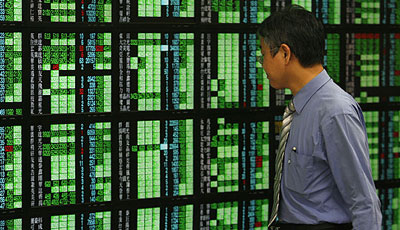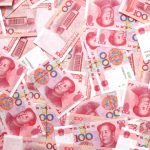Asian Shares Gain After Rosy China Data

IMF says China likely needs more market liberalization before labeling yuan a reserve currency
Asian shares pared earlier losses to trade higher Wednesday after a gauge of China’s service sector reached an 11-month high, outweighing concerns that a rise in U.S. interest rates could be getting closer.
Hong Kong’s Hang Seng Index is up 0.3% and a gauge of Chinese companies listed in the city is up 0.8.
China’s services sector has held up better amid a broader economic slowdown than its manufacturing sector, a gauge of which fell to a two-year low earlier this week. The rosy reading comes amid fears China’s deep stock selloff would hurt its financial-services industry. Despite gains Tuesday, Shanghai remains more than a quarter off from its June high and has fallen more than 8% since July 23.
Earlier Wednesday, the Caixin China services purchasing managers index, a private survey, rose to 53.8 in July, compared with 51.8 in June. A reading above the 50-level indicates expansion in activity.
Still, the Shanghai Composite Index, wavering between negative and positive territory, was last down 1.3% at 3708.66. The smaller Shenzhen Composite was down 0.9% at 2131.29.
The tepid performance of the mainland market follows Chinese authorities’ moves to clamp down on short selling on Monday. The new short-selling rules require investors to wait at least one day to cover their positions and pay back loans used to buy shares. When shorting a stock, investors sell borrowed shares on the belief they can buy them back at a lower price later, pocketing the difference. Analysts have questioned the effectiveness of the measure, given the relatively small scale of short selling in China’s market.
“Investors are deterred by a lack of predictable regulatory rules,” said Deng Wenyuan, an analyst at Soochow Securities. Daily turnover on the Shanghai and Shenzhen market has fallen to less than 1 trillion yuan ($161 billion), half the level before the sharp June selloff, according to data provider Wind Information Co.
Late Tuesday in Washington, officials at the International Monetary Fund said China likely will have to move ahead with market liberalization before it labels the country’s yuan a reserve currency, signaling a decision could be pushed into next year.
The offshore Chinese yuan, which trades freely, rose to as high as 6.2248 against the U.S. dollar, from 6.2180 late Tuesday in Asia. The closely managed currency has been relatively stable in recent months, despite volatility in China’s stocks, but markets expect it to weaken.
Elsewhere, Japan’s Nikkei Stock Average rose 0.5% and South Korea’s Kospi gained 0.3%. Australia’s S&P ASX 200 was down 0.6%,
A weaker Japanese yen ahead of U.S. jobs data on Friday is helping lift Japan’s shares. The currency is down 0.1% at ¥124.42 against the U.S. dollar, its weakest level in roughly a month, compared with a close of ¥124.30 on Tuesday in Asia. A weaker local currency tends to help Japanese exporters, making their goods more competitive, and real-estate developers as land prices rise.
With Japan midway through its earnings season, investors also are looking for companies that might announce share buybacks to increase shareholder returns, said Shun Otsuka, general manager of research and strategy at Ichiyoshi Asset Management. He noted that the scale of buybacks in terms of share value is already at a seven-year high.
Earlier Wednesday, stocks in the region followed losses in the U.S. after Federal Reserve Bank of Atlanta President Dennis Lockhart said the economy is ripe for a rise in short-term interest rates. The Fed’s easy-money policies after the global financial crisis, broadly mirrored by global central banks, have helped fuel stock rallies.
“Investors are looking for clues to the U.S. central bank’s rate hike timing,” said Shun Otsuka, general manager of research and strategy at Ichiyoshi Asset Management, adding that markets will be watching monthly jobs data, set for release on Friday. Investors have been parsing economic data, from inflation to wages, for clues about when the Fed might raise rates.
In Japan, which is midway through its earnings season, investors are looking for companies that might announce share buybacks to increase shareholder returns, added Mr. Otsuka. He noted that the scale of buybacks in terms of share value is already at a seven-year high.
In currencies, a slate of factors has pushed Malaysia’s ringgit to multiyear lows recently, including a potential rise in U.S. interest rates, weak oil prices and worries about political instability. Lower oil prices, which recovered somewhat after breaking below $50 a barrel in recent days, threatens Malaysia’s oil-linked revenue and an investigation into the country’s troubled investment fund has dented investor confidence. The U.S. dollar traded as high as 3.8770 against the Malaysian ringgit, from 3.8506 late Tuesday.
The Australian dollar, which had fallen near six-year lows earlier this week, strengthened after the central bank kept interest rates steady Tuesday and unexpectedly dropped its usual rhetoric about the need for further currency depreciation. The currency last traded at $0.7362, giving up gains after trading as high as $0.7428 yesterday.
“The market was completely caught off guard because, given the weakness in the Chinese economy and the decline in commodity prices, everyone thought that not only would Australian data be weak but the Reserve Bank would grow increasingly dovish,” said Kathy Lien, managing director at BK Asset Management in New York.
Oil prices rose in U.S. trading overnight on expectations inventory data due Wednesday would show U.S. crude-oil supplies fell last week. In Asia trade, futures for Brent crude were up 0.7% at $50.34.
Gold is down 0.5% to $1,085.70 in Asian trade.
Source: WSJ – Asian Shares Gain After Rosy China Data





























